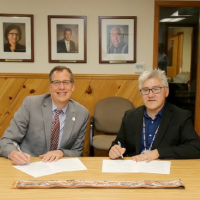
Students of the College of Menominee Nation have a direct transfer path the UW–Madison, thanks in part to the Nelson Institute.
Liberal studies students attending College of Menominee Nation (CMN) will continue to have an easy path to transfer to the University of Wisconsin–Madison thanks to a renewed agreement between the two institutions.
On June 3, UW–Madison leaders traveled to CMN to meet with President Christopher Caldwell, Interim Dean of Letters & Science Lucy Fenzl, and other CMN leadership and tour the college located on the Menominee Indian Reservation. During the visit, Interim Chancellor Karl Scholz joined President Caldwell for the signing of the latest iteration of the transfer agreement.
“We look forward to a robust partnership at CMN. I wish to extent my gratitude to President Caldwell and his colleagues for their outstanding work at CMN and for our partnership to create mutually beneficial opportunities for the students we serve,” says Interim Chancellor Scholz.
Caldwell, a UW–Madison alumnus and current Nelson Institute graduate student, was one of the first transfer students from CMN on the first articulation agreement with the university’s College of Agricultural and Life Sciences in 2002.
The contract allows a qualified students to begin postsecondary education as a freshman at CMN and be guaranteed admission as a transfer student at UW–Madison after completing three academic years, or 60 transferable credits.
The renewal marks the third time the historic contract has been signed between CMN and UW–Madison, with the first campus-to-campus agreement taking place in 2007.
CMN is one of 32 tribally controlled community colleges in the United States and is known as a national leader in sustainable development. In 2020 and 2021, UW–Madison and CMN also partnered together alongside Lac Courte Oreilles Ojibwe College on a first-ever triple partnership between the three institutions for a USDA NIFA New Beginnings for Tribal Students grant to create educational pathways to the three land grant institutions.
The Nelson Institute for Environmental Studies has played an instrumental role in building the collaborative partnership with CMN. Leaders used the visit as an opportunity to discuss how the two institutions can work together to build sustained collaborative programming for both Madison and CMN students and, in future, to provide steady pathways for native students to UW–Madison, where they will feel included and welcome. “Only by building meaningful, shared curricula and instructional opportunities, for both CMN and UW students, can we make real progress in bringing these remarkable institutions together,” says Dean Paul Robbins of the partnership. “I am proud of the hard work Nelson faculty, staff, and students have done to help make this possible.”
A long-term goal of the partnership is to develop collaborative education opportunities. With a particular goal to bolster STEM fields, the UW cohort — which included Francisco Pelegrí, chair of the UW’s genetics department— toured CMN’s lab facilities and met with several staff and instructors. The visit also included stops at the CMN Sustainable Development Institute, weekly farmer’s market, and the library’s special collections, which houses original papers for the Determination of Rights and Unity for Menominee Stockholders (DRUMS) organization that worked to successfully end Termination and Assimilation as federal Indian Policy in the U.S. and re-established Menominee Nation as a federally recognized American Indian Nation.
An earlier version of this story was originally published by UW–Madison.